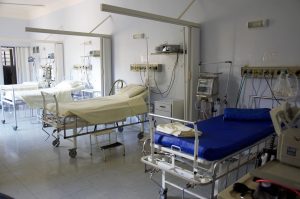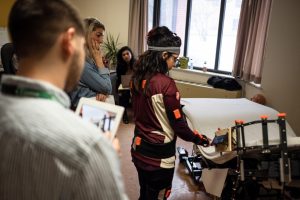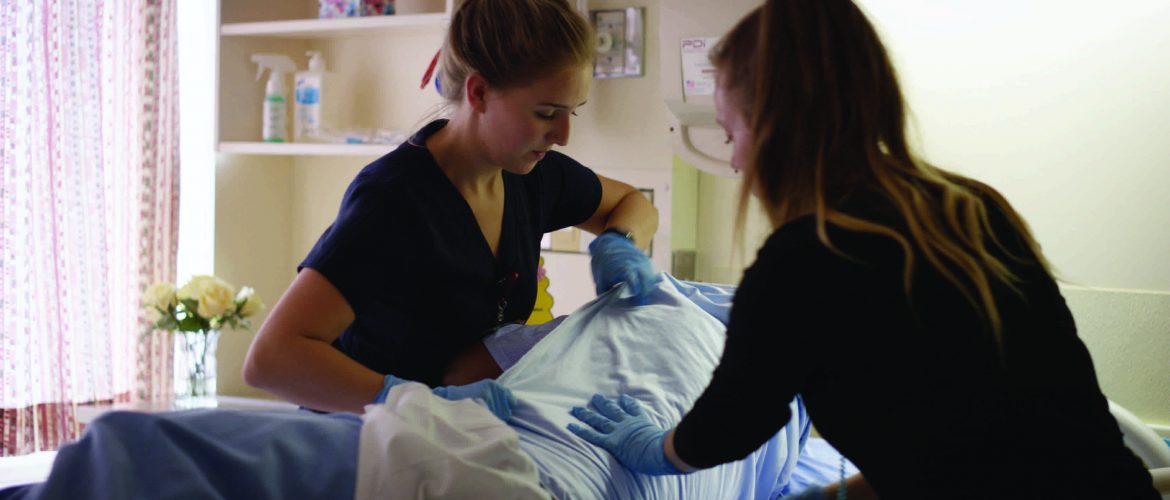Not much has changed for the hospital bed since it first began appearing with electrical functions in the 1950s. Since then, new and more advanced technology has been added to its frame – but the overall concept and design has remained relatively unaltered[i]. Norwegian startup Ably Medical is on a mission to reimagine the hospital bed as we know it today, and in doing so, revolutionize the culture of health care.
The Case for a New Kind of Hospital Bed

Hospital beds have remained relatively static for the past 50 plus years.
Hospital beds are central to patient recovery and the administration of healthcare services. On the flip- side, they can also contribute to serious injuries, especially among older adults living with dementia. According to the Canadian Institute for Health Information, more than 3,000 cases of pressure ulcers (also known as bedsores) are reported in acute care hospitals across Canada each year[ii]. Bed rails, a safety measure designed to keep patients from falling out of the bed, can cause fatal cases of bed entrapment.
Moving patients in and out of hospital beds can also increase the risk of injuries for hospital care staff[iii].
Seeking to mitigate the challenges caused by hospital beds, Ably Medical created a new kind of bed that leverages artificial intelligence (AI) to provide safety and comfort to both patients and caregivers. In addition to these benefits, the Ably Bed’s design functions will decrease the nurse to patient ratio required to move and assist patients, ease the strain on resources and lower costs to the health care system.
How the Ably Bed Works
The Ably Bed is a smart bed that consists of longitudinal motion springs made with built-in sensors that monitor vital signs such as heart rate and weight. The data collected allows the bed to adjust to specific patient needs and forms the basis for its learning capabilities.
The bed also notifies staff if a patient is at risk of further injury or a decline in health conditions. If a patient is at risk of falling, the Ably Bed will adjust its flexible frame to ‘cocoon’ the individual, giving nurses time to react and prevent the fall.
Flexible motion springs in the bed’s frame also help to turn patients over and alleviate built up pressure points along the body. Staff can adjust the length and position of the springs to provide leverage when repositioning or moving patients, lowering the strain on their bodies and risk of injury.
Ane Solesvik Oppedal, head of Ably Medical’s North American operations, believes that the bed will increase the quality of hospital care. “It will help to maintain more dignity, more comfort for the patient, which is very important,” she says.
Oppedal adds that the Ably Bed has the potential to reduce health care costs because it requires less equipment and nursing support to help patients stay safe and comfortable.
“CABHI supported us in all the important steps you don’t realize you need for innovation. They helped us with everything from contracts to teleconferences and helped us engage with stakeholders.”
Testing the Ably Bed
When Ably Medical needed a way to test and validate their product in a real-world setting, the Centre for Aging + Brain Health Innovation (CABHI), powered by Baycrest, extended support through their Industry Innovation Partnership Program (I²P²). The I²P² program connects innovators to health care organizations across North America where they can derive scientific evidence and user validation, which can lead to faster procurement of their solution. The program has helped foster global organizations like Ably Medical to set up operations in Toronto, thus creating foreign direct investment into Canada.
Through I²P², CABHI brokered relationships between Ably Medical and four Canadian healthcare organizations (Hamilton Health Services, Mackenzie Health, Westpark Healthcare Centre, Southlake Regional Health Sciences) where they tested the ability of the Ably Bed to prevent falls, pressure ulcers, and excessive nurse burden.
The research project is being led by Alexandra Papaioannou, executive director of the GERAS Centre for Aging Research, with CABHI’s support. Under Papaioannou’s leadership, front-line health care professionals were invited to engage in the project’s design-thinking process. “What was most exciting for me as a clinician scientist was seeing how engaged staff were in the project,” she says.

The Ably Medical team testing the Ably Bed’s functions.
“CABHI supported us in all the important steps you don’t realize you need for innovation,” Papaioannou says of CABHI’s involvement. “They helped us with everything from contracts to teleconferences and helped us engage with stakeholders.”
Oppedal says having access to the Canadian market has provided valuable learnings for Ably Medical. “The work here in Canada has guided us to the stakeholders we need to involve in the process of designing and shaping what this technology will become,” she says.
Ably Medical hopes to use their experience to finalize finishing touches on the Ably Bed technology before launching the bed in Canada in 2021. Oppedal believes tapping into the Canadian market positions the company for expansion throughout North America and Asia.
“We still have a lot of research to do and there are really great opportunities for us to do that here in Canada,” she adds.
With CABHI’s support, Ably Medical is closer to realizing their goal of re-engineering the hospital bed – and by virtue the global healthcare system – creating even greater opportunities for older adults to access the quality care they need.
Watch this video to learn more:
[i] The history of the hospital bed and their development
[ii] What causes bedsores, and how can you prevent them?
[iii] Personal safety for nurses


